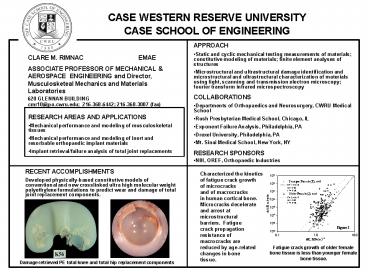CLARE M. RIMNACEMAE - PowerPoint PPT Presentation
1 / 2
Title:
CLARE M. RIMNACEMAE
Description:
... PROFESSOR OF MECHANICAL & AEROSPACE ENGINEERING and Director, Musculosketeal ... mechanical engineering. biomechanics. biomaterials. orthopaedic implants ... – PowerPoint PPT presentation
Number of Views:39
Avg rating:3.0/5.0
Title: CLARE M. RIMNACEMAE
1
- APPROACH
- Static and cyclic mechanical testing measurements
of materials constitutive modeling of materials
finite element analyses of structures - Microstructural and ultrastructural damage
identification and microstructural and
ultrastructural characterization of materials
using light, scanning and transmission electron
microscopy fourier transform infrared
microspectroscopy - COLLABORATIONS
- Departments of Orthopaedics and Neurosurgery,
CWRU Medical School - Rush Presbyterian Medical School, Chicago, IL
- Exponent Failure Analysis, Philadelphia, PA
- Drexel University, Philadelphia, PA
- Mt. Sinai Medical School, New York, NY
- RESEARCH SPONSORS
- NIH, OREF, Orthopaedic Industries
CLARE M. RIMNAC EMAE ASSOCIATE PROFESSOR OF
MECHANICAL AEROSPACE ENGINEERING and Director,
Musculosketeal Mechanics and Materials
Laboratories 620 GLENNAN BUILDING cmr10_at_po.cwru.ed
u 216-368-6442 216-368-3007 (fax)
- RESEARCH AREAS AND APPLICATIONS
- Mechanical performance and modeling of
musculoskeletal tissues - Mechanical performance and modeling of inert and
resorbable orthopaedic implant materials - Implant retrieval/failure analysis of total joint
replacements
- RECENT ACCOMPLISHMENTS
- Developed physically-based constitutive models of
conventional and new crosslinked ultra high
molecular weight polyethylene formulations to
predict wear and damage of total joint
replacement components.
- Characterized the kinetics
- of fatigue crack growth
- of microcracks
- and of macrocracks
- in human cortical bone.
- Microcracks decelerate
- and arrest at
- microstructural
- barriers. Fatigue
- crack propagation
- resistance of
- macrocracks are
- reduced by age-related
- changes in bone
- tissue.
Fatigue crack growth of older female bone tissue
is less than younger female bone tissue.
Damage retrieved PE total knee and total hip
replacement components
2
KEY WORDS cmr10 Rimnac mechanical
engineering biomechanics biomaterials orthopaedic
implants bone tissue ultra high molecular weight
polyethylene fatigue and fracture ultrastructural
and microstructural damage retrieval/failure
analysis































